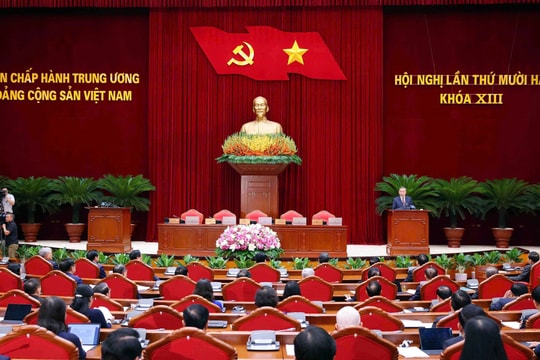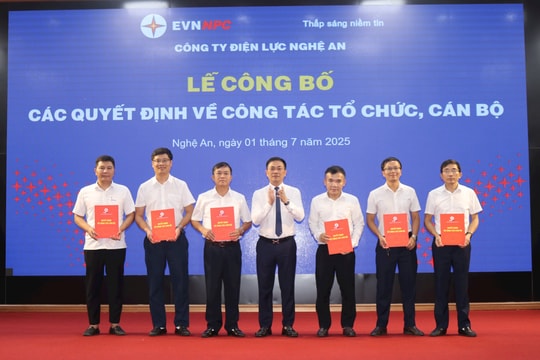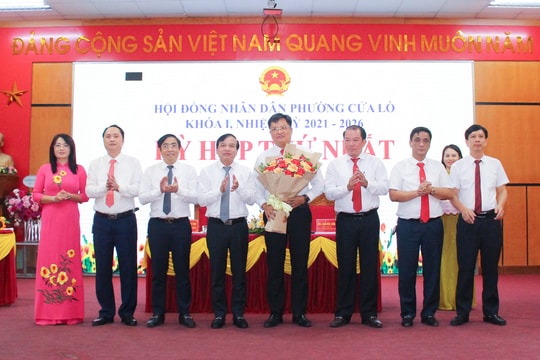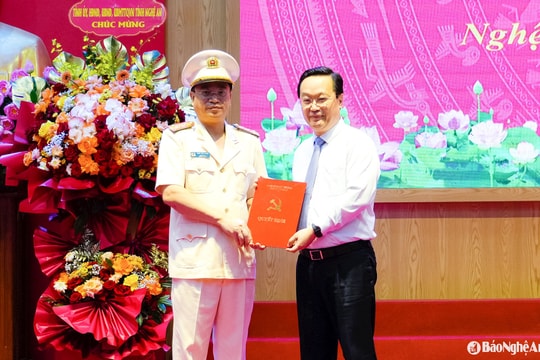Some new points on decentralization of cadre management and appointment and introduction of candidates
(Baonghean.vn) - The Politburo has just issued Regulation No. 80-QD/TW on decentralization of cadre management and appointment and introduction of candidates (hereinafter referred to as Regulation No. 80), replacing Regulation No. 105-QD/TW dated December 19, 2017. The Regulation has a number of specific new points as follows:
1Regulation No. 80 consists of 6 chapters and 34 articles, 02 chapters less and 06 articles more than Regulation No. 105 (including 08 chapters and 28 articles). In which, articles 1 to 3 supplement the scope, objects, purposes, requirements and principles in decentralization of cadre management and appointment and introduction of candidate cadres.
2. Staff management content
Supplementing the re-appointment, re-election, designation, conferment, promotion, demotion, and stripping of military ranks; removal from office; temporary suspension, suspension from office, resignation, and dismissal of officials; and control of power in personnel work.
3. Management and decision-making responsibilities for staff
Clearly define the responsibility of the Central Executive Committee to implement orientations and decide on important policies and issues on personnel work and cadres according to the Working Regulations of the Party Central Executive Committee.(Previously, Regulation No. 105 did not clearly define the management responsibility of the Central Executive Committee).
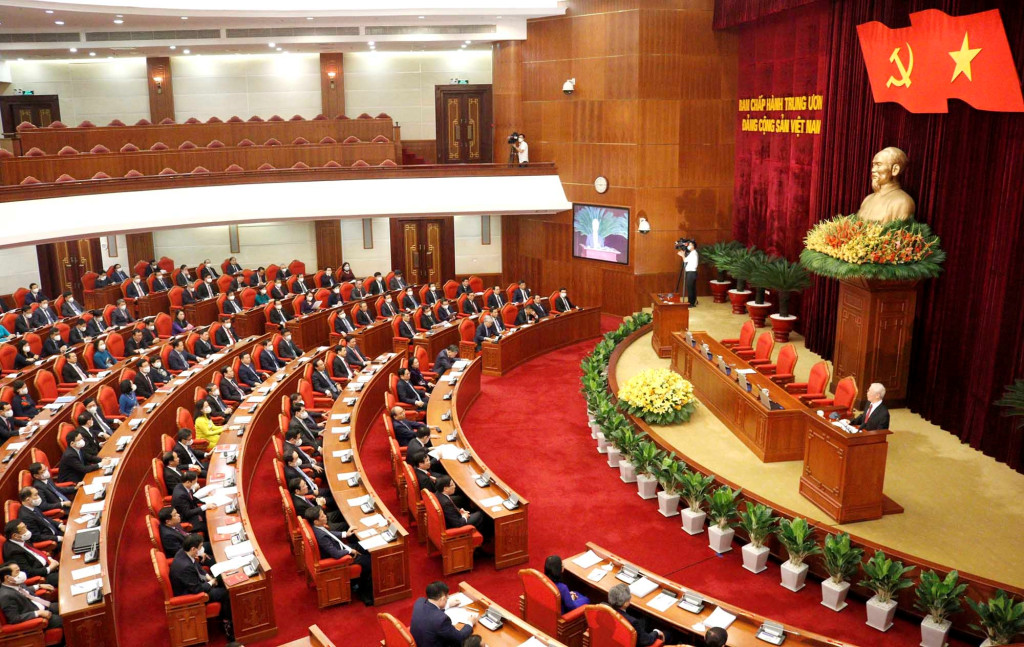 |
| Regulation 80 of the Politburo aims to continue to concretize the Party's policies and Resolutions; to ensure strictness, democracy, publicity and transparency in personnel work and personnel management. |
4.The Secretariat authorizes the President, the Prime Minister, the Chairman of the National Assembly, and the Standing Secretary of the Secretariatwithin the scope and field of responsibility, consider and decide on the assignment, appointment, and nomination of candidates for cadres under the management of the Secretariat to hold titles and positions with concurrent structures of the Vietnam Fatherland Front, socio-political organizations, friendship parliamentary organizations of Vietnam with other countries, and steering committees according to regulations. Re-appoint and implement retirement regime for cadres under the management of the Secretariat according to regulations(Previously, according to Regulation No. 105, this content was under the authority of the Secretariat).
5. Responsibilities of provincial and municipal Party Committees
Supplementing the content on the authority to decide on adjusting the structure of the Party Committee and the Standing Committee of the Party Committee in addition to the structure of the Party Committee and the Standing Committee of the Party Committee determined according to the regulations of the Politburo.
6. Responsibilities of the Standing Committee of the Provincial Party Committee and the City Party Committee
- Supplementing the contents of personnel work for the heads of the National Assembly delegations in provinces and centrally run cities.(Previously, according to Regulation No. 105, the authority to consider and nominate candidates for the position of Head of the Provincial National Assembly Delegation was the Central Government).
- Decision to approve the planning of positions of members of the inspection committee and other positions under the management authority of the standing committee of the provincial and municipal party committees according to regulations.
- When necessary, delegate the power of secretary and assign responsibility to subordinate party committees.
7. On the responsibilities of the Central Military Commission and the Central Public Security Party Committee
- Clarify the authority of the Standing Committee of the Party Committee of the Military Regions and the Border Guard to preside over, coordinate, and exchange opinions with the Standing Committee of the Provincial and Municipal Party Committees regarding personnel: Commanders, Deputy Commanders, Political Commissars, Deputy Political Commissars of the Military Commands and Border Guard Commands of the provinces and centrally-run cities;
- The Standing Committee of the Central Public Security Party Committee exchanged opinions on personnel for directors and deputy directors of provincial and municipal public security.
8. On the approval of staff planning
Previously, the Politburo had to approve the planning positions under the management of the Politburo and the Secretariat. Regulation No. 80 has added the responsibilities and powers of the Politburo, which is to authorize the Central Organizing Committee to approve the planning of leadership and management positions under the management of the Politburo and the Secretariat (except for Central Committee members, including alternates).
9. On appointment of staff
- When appointing cadres, the criteria of the cadre's reputation will be considered. Therefore, if the cadre does not have reputation or does not have enough reputation, he/she will not be appointed. In addition, Regulation No. 80 adds the principle of appointing cadres that cadres and party members who are under disciplinary review and handling will not be appointed.
- Regarding the conditions for appointing officials, a provision has been added that officials must have held the current position or equivalent position for at least 2 years.
In addition, Regulation No. 80 changes the conditions for appointing officials in disciplinary cases as follows:
Disciplined officials shall not be assigned, appointed, or recommended for candidacy to a position higher than the position they were disciplined for within the following period of time (calculated from the date of signing the disciplinary decision):
-12 months for the disciplinary form of Reprimand.
- 30 months for the disciplinary form of Warning.
- 60 months for the disciplinary form of dismissal.
The period of ineligibility for appointment to a higher position has been more specifically regulated than previously.
10. Regarding the appointment process and introduction of candidates
- Supplement and clarify the process for personnel from other places in step 2: Discuss and get opinions from the collective leadership of the place where the cadre is working on the policy of transferring, appointing, and introducing cadres to run for election (the recommended person must receive more than 50% of the votes compared to the total number of people summoned; in case the recommended person receives 50% of the votes (not more than half), the head will consider and decide); get assessments and comments from the locality, agency, unit and personnel records according to regulations.
- Regarding the voting results, the method of calculating the percentage of votes is more clearly specified: The person who gets the highest number of votes, over 50% of the total number of people summoned, will be selected for recommendation and appointment.(Previously it was written as the total number of people summoned to attend the conference, so there are many different interpretations).
For on-site personnel (in the 5-step process), the principle of introduction and selection at conferences is: Each member introduces 1 person for a position; the person who gets the highest number of votes of agreement over 50% of the total number of people summoned will be selected.In case no one gets more than 50% of the votes, select all the people with 30% or more votes to be introduced in the next step. In case no one gets 30% or more votes, do not continue with the next steps and report to the competent authority for consideration and direction.(Previously, according to Regulation No. 105, if no one received more than 50% of the votes, the two people with the highest number of votes from top to bottom were selected to be introduced in the next steps).
11. About personnel records
No time limit for the conclusion of political criteria for personnel(Previously, the Political Standard Conclusion was valid for 6 months).
12. On secondment of staff
In Article 29 of Regulation No. 80, there are the following changes: Only leaders and managers are eligible for staff mobilization and secondment.(Previously, Regulation No. 105 defined the subjects as cadres who were mobilized or seconded due to work requirements according to decisions of competent authorities).
13. On decentralization of management for cadres who have left their positions or retired (Article 15)
- Previously, Regulation No. 105 was placed in the appendix.
- There are some new points as follows: Cadres under the management of the Politburo and Secretariat when they have left their positions or retired(except for those who have ceased to hold a position or have been transferred or assigned to other jobs that are not under the management of the Politburo or Secretariat)must be considered and commented on by the Politburo and the Secretariat on the following issues:
+ Participate in candidacy for leadership positions of the Vietnam Fatherland Front and socio-political organizations(Previously, according to Regulation No. 105, it only included the positions of chairman, vice chairman, general secretary and equivalent positions of the Vietnam Fatherland Front and socio-political organizations); be a member, leader, or manager of organizations with foreign elements(This content was not previously included in Regulation No. 105); Chairman of the board of members (board of directors), director (general director) of a joint stock enterprise or an enterprise with foreign direct investment (FDI).
+ Going abroad(Previously, according to Regulation No. 105, permission was only required when going abroad using the state budget).
There are also some new points in layout, presentation, and wording, but the content does not change compared to Regulation No. 105.

.jpg)
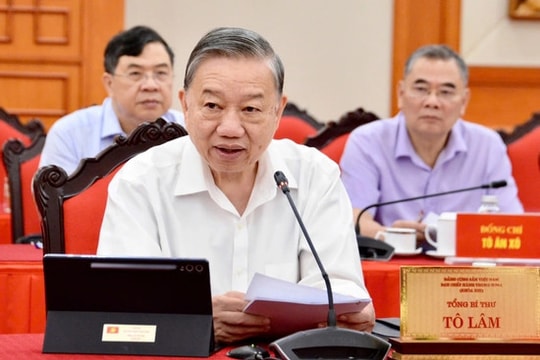
.jpg)
